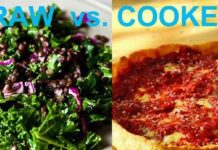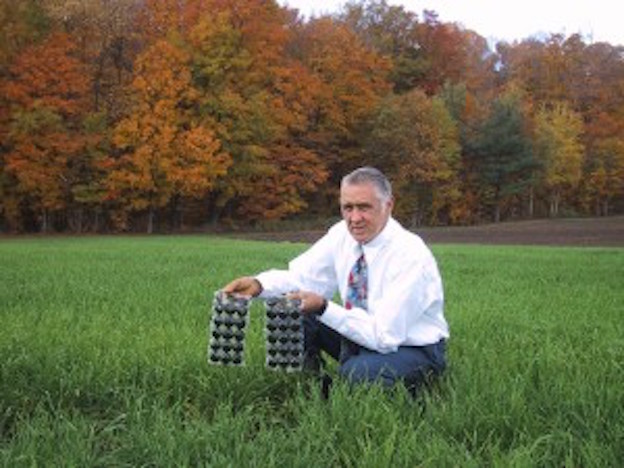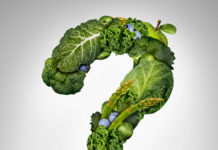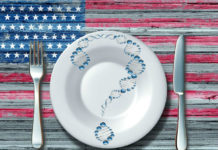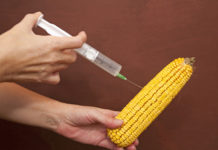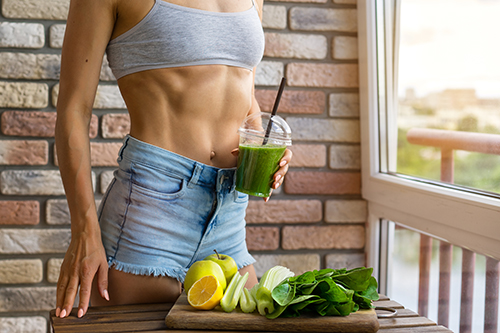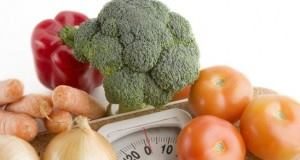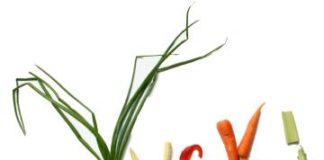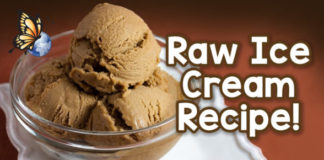Athletes often like to experiment with vitamins, protein powders and pills, forgetting a simple yet vital performance factor — their diet. While genetic, physical, and psychological factors all play important roles, poor eating habits and poor nutrition can be the biggest factors in poor performance. Due to the heavy demands of exercise, athletes need extra nutrition. There are three basic fuels the body relies on while exercising — carbohydrate, fat, and protein. More calories from these fuels are needed to sustain energy and maintain lean body mass.1 A raw, whole food vegetarian diet is the optimal sports diet for raw athletes.3
 In particular, a balanced diet that is high in carbohydrates, low in fats, and adequate in protein, is ideal.1,2 Due to a high carbohydrate and low fat content, a raw food, vegan diet is best.3 It is rich in vitamins, minerals and antioxidants — important nutrients that help the body utilize energy and protect it from the stress of exercise.
In particular, a balanced diet that is high in carbohydrates, low in fats, and adequate in protein, is ideal.1,2 Due to a high carbohydrate and low fat content, a raw food, vegan diet is best.3 It is rich in vitamins, minerals and antioxidants — important nutrients that help the body utilize energy and protect it from the stress of exercise.
Your body is always burning a mixture of carbohydrate, fat, and protein. The duration of exercise, intensity of exercise, level of physical conditioning, and initial muscle glycogen levels will determine which primary fuel your body will use.4 In general, carbohydrate is the primary fuel utilized during high intensity exercise. In fact, about 55 to 75 percent of calories in the diet should come from carbohydrate, and even more in individuals who compete in endurance or ultra-endurance events.1 Whole fresh foods are excellent sources of carbohydrates. for raw athletes.
With prolonged exercise at lower intensities, fat (in the form of fatty acids) becomes the primary fuel source. The shift to fatty acids during exercise helps spare the carbohydrate (glycogen) stores in your body and allows for prolonged exercise. However, while high carbohydrate intake is recommended for performance, there is no need to increase fat in the diet beyond the commonly recommended 10 to 30 percent of calories, as it is taken from storage sites in the muscles when needed. Increasing fat in the diet is not recommended for improving performance for raw athletes.5
Compared to carbohydrate and fat, protein is used only minimally for fuel,4 as its primary function is for building and maintaining the tissues of the body. Overall, a high-carbohydrate diet is most important in ensuring optimal storage of carbohydrate in the body, fueling the body for exercise, and supporting performance in both endurance6 and strength.7,8 A vegetarian diet, which emphasizes uncooked whole nuts, seeds, grains, fruits, and vegetables provides the high carbohydrate content to fuel your body through training sessions and competition.
Strength and endurance athletes both have increased protein needs.1 Protein, composed of chains of molecules called amino acids, plays an important role in the building, maintenance, and repair of the tissues of the body, including muscle. There are 20 different amino acids in the foods we eat, but our body can make only 11 of them. The 9 essential amino acids which cannot be produced by the body must be obtained from the diet. A diet based on a variety of grains, legumes, and vegetables easily provides all of the essential amino acids. It was once thought that various plant foods had to be eaten together to get their full protein value, a method known as “protein combining” or “complementing.” We now know that intentional combining is not necessary to obtain all of the essential amino acids.9 Protein should come from plant sources, rather than meat, dairy products, and eggs, which are devoid of fiber and complex carbohydrates.
Remember, it is also important to maintain optimal hydration status for peak performance and to prevent injury. Dehydration, defined as body weight loss of 1 percent or more due to fluid loss, results in a number of symptoms including headache, fatigue, heat intolerance, and dark urine with a strong odor. More serious effects include heat cramps, heat exhaustion, and heat stroke. By maintaining a regular fluid schedule of at least eight 8-ounce glasses of water per day, these symptoms are easily prevented.12
Fluid needs increase with exercise. Additionally, participating in activity at high altitudes, low humidity, and high temperatures can also increase fluid needs.12 The following guidelines, endorsed by the American College of Sports Medicine, can help you stay hydrated:13
- Two hours before exercise: Drink 17 ounces (or about 2 cups) of fluid.
- During exercise: Drink 4 to 8 ounces (or about 1/2 to 1 cup) of fluid every 15 to 20 minutes.
- After exercise: Drink 16 to 20 ounces (or about 2 to 2½ cups) of fluid for every pound lost during exercise; weighing yourself before and after exercise can help you determine your fluid loss.
Water is ideal for replacing fluids, particularly for activities lasting less than one hour. Sports drinks have become popular for activities lasting more than 60 to 90 minutes, since they contain carbohydrates and electrolytes. However, they also contain “dead” processed ingredients and tons of processed white sugar. Fortunately, electrolytes and carbohydrates can be easily ingested through raw, uncooked food. The healthy digestive system of an athlete who eats mostly whole, raw vegan foods can quickly and easily assimilate everything needed following a training session or event.
The sports diet must be as carefully planned as the training regimen. A raw vegetarian diet, emphasizing consumption of a variety of foods is an optimal sports diet for both performance and health. By choosing generous servings of these foods with a focus on variety and wholesomeness, raw athletes bodies will reap the benefits.
- Soaked/Sprouted Nuts & Grains: These are rich in complex carbohydrate, fiber, enzymes, amino acids, zinc, and B vitamins.
- Vegetables: Choose a variety of colorful red, orange, and yellow vegetables in addition to leafy greens for vitamin C, beta-carotene, and other antioxidants that will protect your body from the stress of exercise. These foods also provide iron, calcium, fiber, plus some amino acids as well.
- Soaked/Sprouted Legumes: Sprouted chickpeas, mung bean sprouts and other bean sprouts are not only high in amino acids and rich in complex carbohydrate, fiber, iron, calcium, and B vitamins.
- Fruits: Choose a variety of fruits and juices for extra vitamins, especially vitamin C.
- Probiotics: Healthy bacteria are an essential part of your digestive system, and usually in short supply for most people. Looks for around 12 strains of probiotic bacteria grown on a raw green superfood like wheatgrass for even more concentrated amino acids, vitamins, minerals, enzymes and antioxidants and other phytochemicals.
Selected References
- Position of the American Dietetic Association and the Canadian Dietetic Association: nutrition for physical fitness and athletic performance for adults. J Am Diet Assoc 1993;93:691.
- Houtkooper L. Food selection for endurance sports. Med Sci Sports Exerc 1992;24(9suppl):S349-59.
- Nieman DC. Vegetarian dietary practices and endurance performance. Am J Clin Nutr 1988;48(3suppl):754-61.
- Liebman M, Wilkinson JG. Carbohydrate Metabolism and Exercise. In: Nutrition in Exercise and Sport, 2nd ed. Wolinsky I and JF Hickson, eds. CRC Press: London,1994.
- Williams C. Macronutrients and performance. J Sports Sci 1995;13:S1-10.
- Jacobs KA, Sherman WM. The efficacy of carbohydrate supplementation and chronic high-carbohydrate diets for improving endurance performance. Int J Sport Nutr 1999;9(1):92-115.
- Haff GG, Stone MH, Warren BJ, et al. The effect of carbohydrate supplementation on multiple sessions and bouts of resistance exercise. J Strength Cond Res 1999;13(2):111-7.
- Leveritt M, Abernethy PJ. Effects of carbohydrate restriction on strength performance. J Strength Cond Res 1999;13(1):52-7.
- Position of the American Dietetic Association: vegetarian diets. J Amer Diet Assoc 1997;97(11):1317-21.
- Food and Nutrition Board. Recommended Dietary Allowances, 10th ed. National Academy Press: Washington, DC,1989.
- Lemon PW. Do athletes need more dietary protein? Int J Sport Nutr 1995;5(suppl):S39-61.
- Kleiner SM. Water: an essential but overlooked nutrient. J Amer Diet Assoc 1999;99:200-6.
- Convertino VA, Armstrong LE, Coyle EF, et al. American College of Sports Medicine position stand. Exercise and fluid replacement. Med Sci Sports Exerc 1996;28:i-vii.
- Puhl SM, Buskirk ER. Nutrient Beverages for Exercise and Sport. In: Nutrition in Exercise and Sport, 2nd ed. Wolinsky I and JF Hickson, eds. CRC Press: London, 1994.
Originally published 2012.
Also Read:



